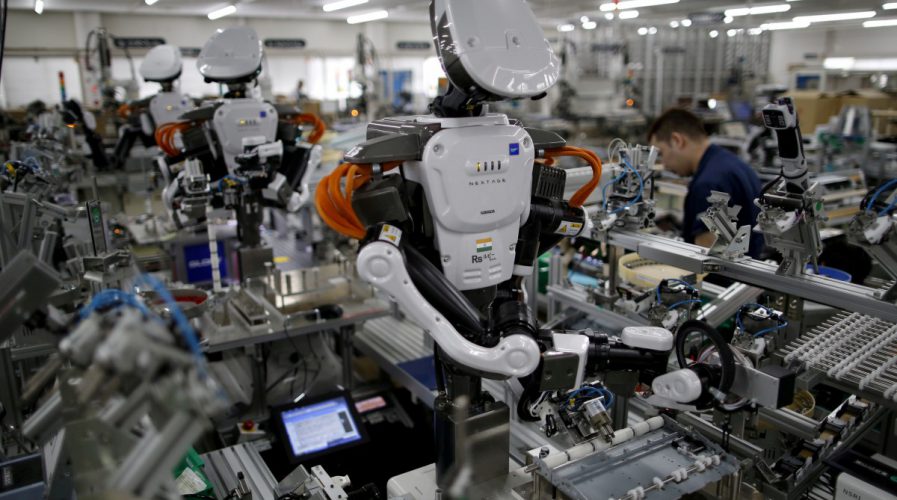
Japan recorded their first downgrade of the economy for the first time in eight months due to a fall in machine orders. Source: Reuters
The New Luddites: WEF’s Nick Davis on Fourth Industrial Revolution and future of work
AS MANUFACTURERS and companies all over the world are beginning to integrate robotics and automation in their systems, the question of the future of work hangs in the air. In the last year or so, the world has grappled with the question of what the future holds in the face of increasing job losses, the growth of the gig economy and our increasingly digital lives.
Labor forces are now faced with a daunting future with no plan in sight: what happens after the robots take over? The gig economy is no longer a movement on the fringes of society, but is increasingly driving the world, with Katz and Kreuger estimating in the United States, temporary work accounts for 93 percent of all job growth.

Davis is the Head of Society and Innovation, Member of the Executive Committee, World
Economic Forum, Geneva. Source: CeBIT
Albeit fantastic in situations where people are empowered to choose their work lifestyle, the new economy is fraught with uncertainty and algorithms are notoriously capricious – and in a world where your boss could be an algorithm, the problems we need to solve have yet to present themselves.
At this year’s CeBIT conference, which took place in Sydney, the World Economic Forum’s (WEF) Nicholas Davis spoke to Tech Wire Asia about how the Fourth Industrial Revolution – already becoming more defined in our policies, technologies and shifting cultural attitudes – has softened the ground for a modern-day Luddite movement, and why it’s imperative for us to start having meaningful conversations not only about what work is valuable, but what its very nature is.
Tell me about the Fourth Industrial Revolution. What is it and what are its implications?
It is a way of looking beyond the digital revolution – what we think of the third industrial revolution in a range of world-changing technological systems. We had the First Industrial Revolution back in 1758 – it was coal and steam, trains, the first factory and mechanization.
The Second Industrial Revolution at the beginning of the 20th century gave us cars, mass production, electricity, telephones, gas turbines and engines. Then we had this amazing digital build up on top of all those things the Second Industrial Revolution gave us.
We’re still going through that trend, but we’re starting to see these amazing technologies which take digital for granted, in the same way digital takes electricity for granted. These new technologies build on top of digital. More importantly, they promise entirely new ways of creating value – whole new industries, new ways consumers will interact through virtual reality, or how transactions need to be done with blockchain.
If you think about gene-editing and CRISPR (Clustered Regularly Interspaced Short Palindromic Repeat – an integral part of modern gene experiments), people are [now] writing and trying to agree among themselves about what you can and can’t do with human embryos. All those things are fundamentally challenging to us, and the laws, regulations, social norms and standards are literally being written today.
So the big question about the Fourth Industrial Revolution is, what do we want that future to look like? What are the values and ideas that we want to build into that? How can we do that without making it a top-down, regulation-driven structure, but rather an inclusive opportunity for people to really say what they want for their families and futures, rather than leaving it up to the powerful tech companies and tech entrepreneurs?
What kind of disparities are we seeing between people who are facing the brunt of the Fourth Industrial Revolution’s effects and the conversations we are currently having? What conversations should we be having?
I think there’s a couple of things: firstly, there’s a lot of disparities we have to care about. One of them is recognizing a lot of conversations about technology take part between people who are really privileged enough to have incomes and live in countries where [connectivity is taken for granted].
We have to remember the four billion people who don’t have access to the Internet, the 1.2 billion people who don’t have electricity, and the 600 million people who don’t have any kind of access to fossil fuels and are living very, very marginal lifestyles at poverty rates below what Australians or even Malaysians were like 200 years ago. That’s a real challenge, we have to think about how the decisions we make affect vulnerable populations, and how do we make sure their voices are heard and they are not marginalized.
The second thing is there are a lot of people who feel their choices are fairly constrained by technology. In some cases, I can’t even choose not to have a Facebook account, because my Facebook account is linked to my car-sharing service. If I’m in San Francisco and I want to use that car-sharing service, I can only log on if I have a Facebook account. In China and other countries increasingly, your social media profile is used as a measure of your social status – these things are also happening in the West.
We are [entering] a world where we’re starting to take away power from people.
I think people are feeling a bit disenfranchised, but even if you aren’t worrying about it right now, I think it’s a topic for the future we should be having serious conversations about – making sure we’re on the right track so we don’t find in ten years’ time, there isn’t any security or privacy, and mistakes people make can really compromise their entire lives.
Are there conversations happening in the West regarding the current refugee crisis and the Fourth Industrial Revolution? I can imagine a lot of the (imagined or not) anxieties about migrants coming in might stem from the fact people fear losing their jobs, though that loss can largely be attributed to automation.
It’s been really interesting to think about that discussion that’s happening in the US that’s kind of pointed a little obviously to migration, but also a huge amount to outsourcing as the causes of job losses. In fact, the data by Ball State University last year showed 83 percent of job losses in US manufacturing was actually due to automation and capital investments, instead of outsourcing. Not necessarily the refugee crisis, as that kind of thing tends to be affected by factors bigger than technology, like the war in Syria.
Fourth Industrial Revolution –https://t.co/joONR5Wi1M pic.twitter.com/E6r0KWzlcz
— Paul Haddon (@Paul_haddon_gir) May 29, 2017
We’re not pointing the finger at [technology], but there’s a big issue here about the increased pressure of migration flows for other reasons – will that cause people to point the finger at technology and create a backlash against the robots? That’s a very real danger, and the social acceptance of technologies, the way we tell stories and guide technology policies so that they actually benefit people, is a critical question. It’s a topic governments, businesses, universities and academics, the media and civil society, need to be pushing on and understanding – because if it gets politicized and polarized, and becomes an anti-technology discussion as opposed to a pro-inclusion or pro-fairness discussion, then we have a big problem.
Go back to the first Industrial Revolution – if you used the word “Luddite” people will say “that person is anti-technology”. It’s true the Luddites were a social movement in the early 19th century that sent threatening letters to owners of mills, and broke machines. But they weren’t anti-machine – they were talking about the quality, the living standards lives that had been taken away from them. Factory owners were using technology as an excuse to depress wages and take power away from them.
So, we want to make sure if there is a new Luddite movement, it should be framed in a really positive way. It’s about saying it’s time to reinvent our institutions around social protections in such a way people get the most out of technology, and let’s not leave all of this up to companies [that will only want to profit without giving people a say in their innovations].
What are your thoughts on the future of work?
The first thing is that when people think about the future of work, they’re still thinking in a 19th and 20th century construct of “your work is your job”. That’s shifting a lot in terms of people who are now willingly able to take up positions that represent a whole range of activity. Unfortunately, while that’s happening, it’s happening to people who are more precarious, that have less certainty and are more fragile and exposed to health issues, or are not saving for a pension or retirement.
It’s really important for us to expand our notion of work, but if we do, we need to expand our notion of social protections. We need to create better community relationships between people in order to support that more nebulous, “eating what they kill” [way of life], as opposed to buying into the certainty and the knowledge an employer has to have a pretty good reason before they can get rid of me.
I think the bigger question here is how do we expand this notion of valuable work to the thing we don’t actually bring into the formal economy, and we may not want to bring into the formal economy. These are things like social care, volunteering, and community work. We don’t want to make them into transactions, and I don’t think we want to try to reduce them to something of [monetary] value. I think we want to encourage people and reward people for those kinds of activities in new ways, and take into account in the fact not all value is created by working for a dollar for an amount of a time.
READ MORE
- The criticality of endpoint management in cybersecurity and operations
- Ethical AI: The renewed importance of safeguarding data and customer privacy in Generative AI applications
- How Japan balances AI-driven opportunities with cybersecurity needs
- Deploying SASE: Benchmarking your approach
- Insurance everywhere all at once: the digital transformation of the APAC insurance industry
